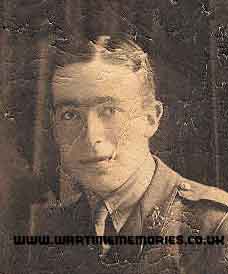Additions will be checked before being published on the website and where possible will be forwarded to the person who submitted the original entries. Your contact details will not be forwarded, but they can send a reply via this messaging system.
please scroll down to send a message
2nd Lt. Frank Wesley Blackmore
British Army 4th Btn. Royal West Surrey Regiment
from:St George, Bristol
In their edition of 28th November 1917 the London Gazette announced that as at 31st October 1917 Frank Blackmore had been commissioned as a 2nd Lieutenant with the 3rd (Reserve) Battalion, Royal Sussex Regiment from his Officer Cadet Unit, which entitled him to the princely wage of 7s. 6d. per day. 3rd Btn. Sussex Regiment was a depot/training unit and remained in the UK throughout the war. During his officer training he contracted influenza due to strain and exposure, causing him to complain of "general weakness, coughing and night sweats". The Medical Board's Report on 29th August 1918 indicated that he had become anaemic and had lost weight; there was also a patch of "tubular breathing below clavicle on left side". Tubular breathing could be recognised by placing the the stethoscope over the trachea and listening to the patient as they breathe in and out with mouth open. What you would hear is a "tubular" sound similar to air being blown through a tube.
As there had not been any noticeable improvement in his health, Frank was instructed to report back for duty with his regiment. He had by then been gazetted to the 4th (Reserve) Battalion, Queen's Royal West Surrey Regiment which had been formed as the 4th/4th Battalion (Terriorial Force) in July 1915 at Croydon before moving to Windsor and Purfleet. On 8th April 1916 it became the 4th (Reserve) Battalion and moved to Crowborough, East Sussex where it remained until October 1916. Then it moved to Tunbridge Wells where it remained as part of the Home Counties Reserve Brigade of the Territorial Force. They were responsible for the training of new recruits and of men returning to duty after being in medical care or away for any other reasons. They were often called "The Mutton Lancers" due to their lamb and flag cap badge. Presumably Frank was no longer considered fit for active front line service because of his medical record and was thus given the responsibility of assisting in the training of the men in his battalion.
